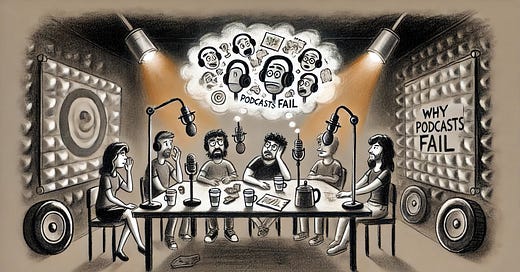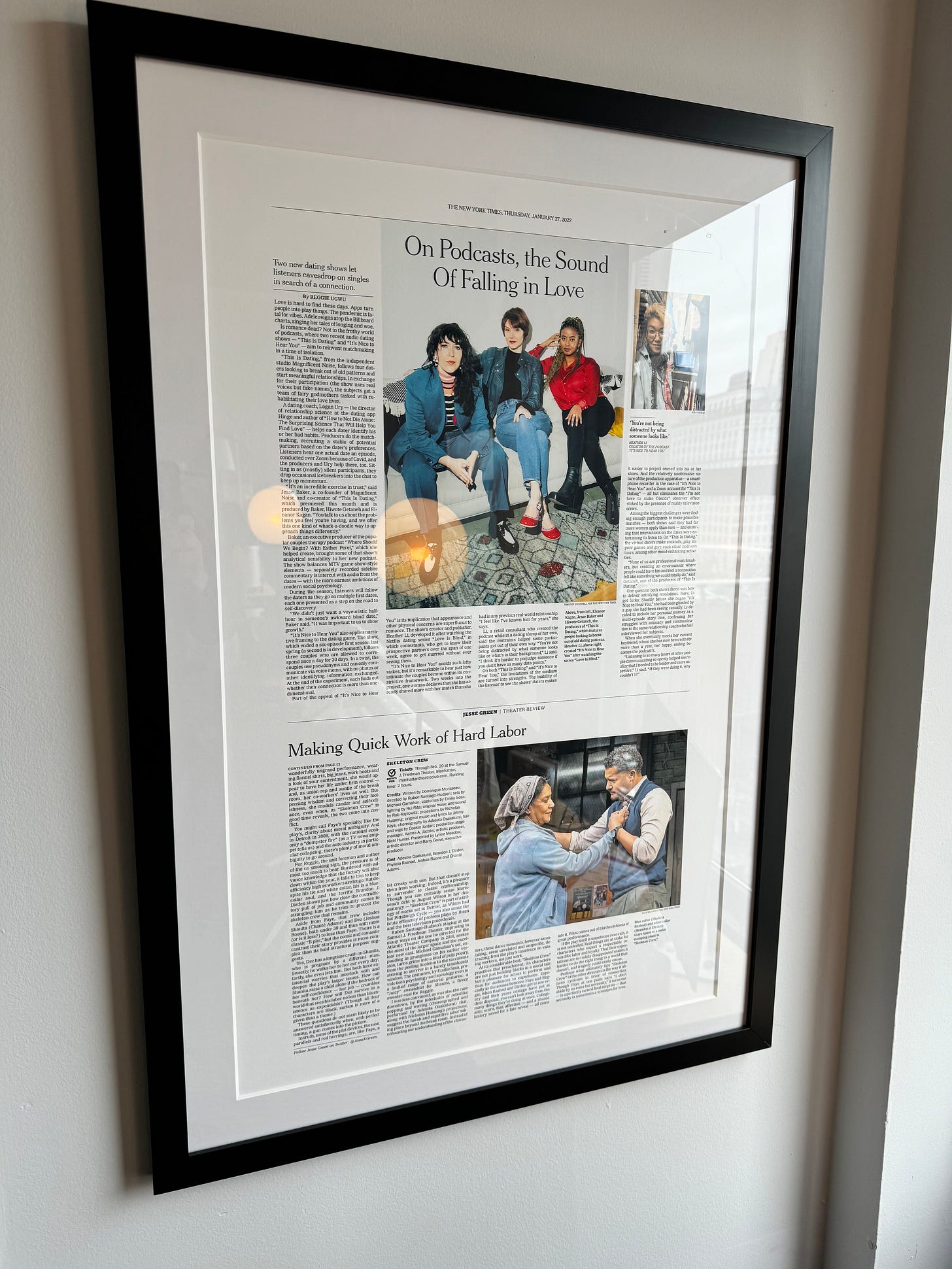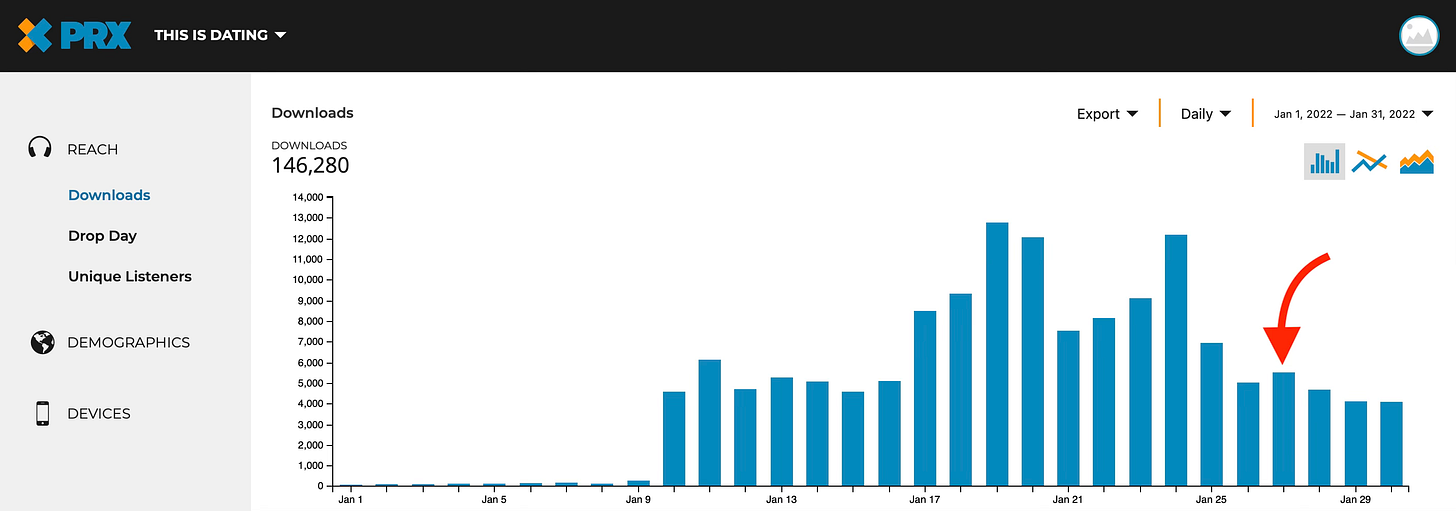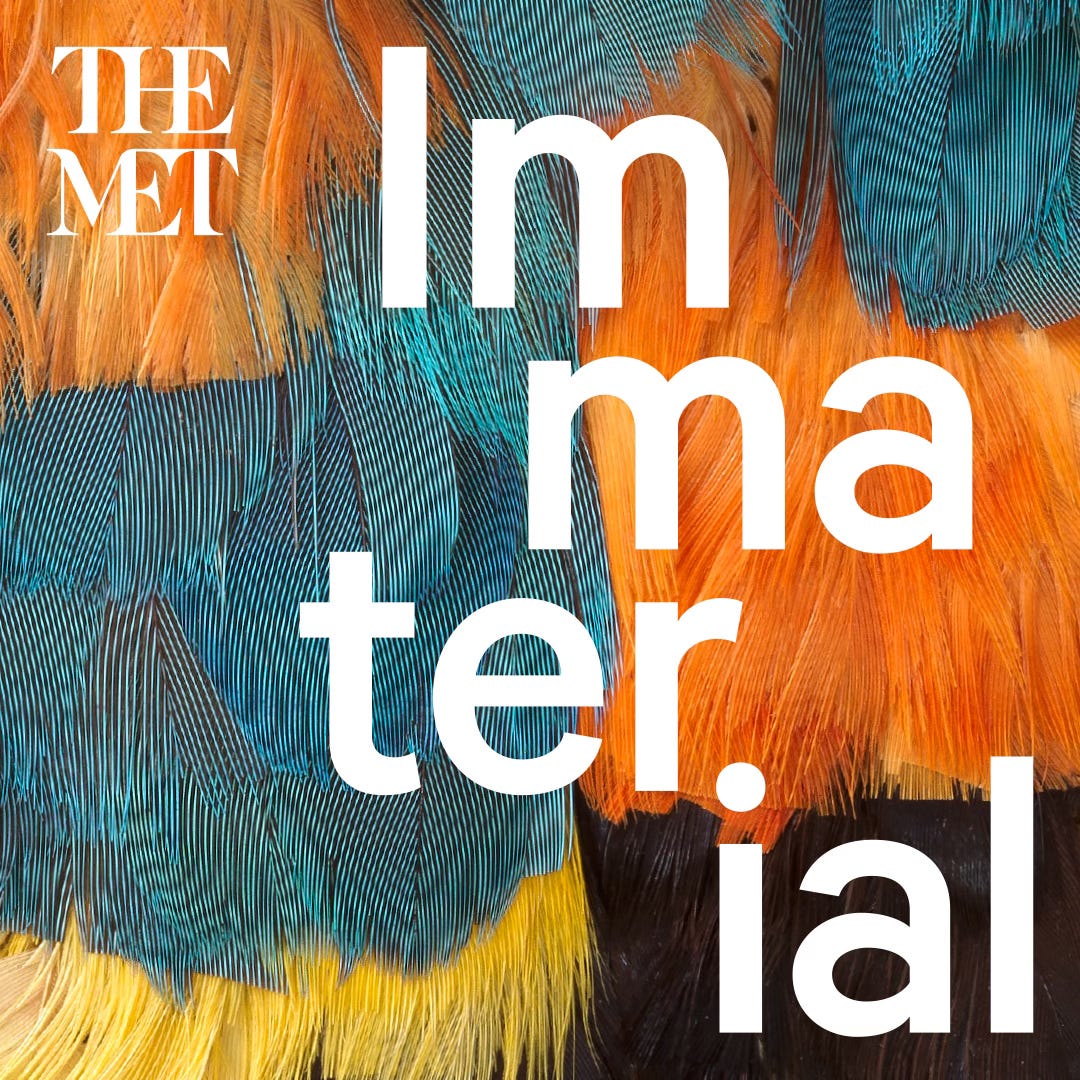Why Podcasts Fail
Everyone takes inspiration from their favorite hit shows, but you can probably learn more from the shows that didn’t do so well.
Welcome to Dispatch #65 of The Audio Insurgent.
So I have noticed that this is the second time I’ve talked about aspects of “failure” in as many months. Don’t read anything into that–or at least anything negative. I’m a big fan of failure: I’m a fan of trying big ideas (knowing that many of them won’t work), I’m a fan of admitting when things aren’t what you hoped, and I’m a fan of learning from the mistakes you make and those others make. It’s not that I am satisfied with failure, far from it, but I do think we learn more, faster, when we embrace failure as part of the journey to doing great things.
What’s below is taken from a session I just did at the Podcast Power-Up Summit as part of Radiodays North America in Toronto three weeks ago. It is a presentation I’ve wanted to give for a while.
Here goes…
[TODAY’S MAIN THING: WHY PODCASTS FAIL] Failure is inevitable. It happens all the time. In fact, as a creative working in the media industry, you need to accept that most projects fail. Yes, think about that. Most movies lose money, most books never earn back their advance, most TV shows struggle to find an audience. Most projects don’t win awards or make “best of” lists. It is such a weird way to do business, but all media functions like that: most projects don’t succeed, but a few do and make up for everything else. The same is true for podcasts. Depending on whose math you use, there will be around 600 new podcasts released today. And ~600 more tomorrow–and every day after that. How many of those do you think will be “successful?” Enough to count on both hands? One hand?
A lot of that answer is tied to what “success” means–and different podcasts can have different answers to that question. But you need to have a specific answer, defined pretty much when you first start producing it.
And that brings us to our first of five reasons why podcasts fail. We’ll review my “top five” reasons why podcasts fail, and then I’ll offer you a few things that help podcasts succeed.
Reason Why Podcasts Fail #1: You Don’t Know What You Are Making Or Why
Recently I was doing a consulting call with an organization that was producing a few podcasts and was having trouble growing them. There were several of their show runners on the call with me. I asked one what her show was about.
“It’s a book show,” she replied.
“Okay, what does that mean?” I asked. “Like, what kind of book show is it? What is it specifically about?”
“Well,” she replied. “It is a book show, but it is also about what books tell us about society. It’s about literary fiction, but we talk a lot about non-fiction books too, like self-help and inspiring true stories. I love mysteries too, so it's about that too. It’s about how books reflect our understanding of justice. It’s about writing. It’s for readers, too. We also talk about the publishing industry, especially how it applies to writers we have on the show. So we report some pieces. We interview authors about their work. It is about how books make us feel. It is about local authors. It is about interesting, unusual, or up and coming writers. Basically, it is for anyone who reads.”
I wrote all this down, pretty much in real time. Then told her that it sounds like this is a podcast for everybody. She replied it was. At that moment, I resisted telling her what I often say about appealing to everyone: “When you try to appeal to everyone, you end up appealing to no one.”
It surprised me constantly how much energy people will put into a project while lacking a clear idea about what it is. I’ve seen organizations invest millions into shows without a clear articulation of what the show is, who it is for, what problem it solves, and why it matters.
Admittedly, as someone who often gets paid by talent and organizations to help answer those questions, that problem is an important part of our business. But that’s because it is probably the single largest fail point for podcasts. Many podcasts are destined to fail before they even get off the whiteboard or out of the notebook. And most teams who make podcasts (and I paused when writing that to make sure I believe that, and I do)...most teams fail because each individual team member has a semi-formed idea of what the show is–and most of their disagreements or creative tensions rise from that disconnect. Or perhaps they have a vague understanding of what it is about–and each of them differs in their specific definition.
But the bottom line is this: if you don’t have a clear idea what you are making, how do you expect the audience to understand that?
Returning to success metrics, you also need to have a clear idea why you are making this podcast. Most people immediately rush into thinking about money when you talk about success. There are multiple financial ways to benchmark success, but not everyone measures success with dollars/pounds/euros/yen/etc. Some measure success by how many people they reach. Some measure success by how often they reach an audience. Some measure success by simply being able to bring a story or idea into the world. Some measure success by who that audience is. Some judge their success by what chart position their podcast hits–or if they get any press coverage. Some measure success by how a podcast helps them fill seats for an event, people who walk into their business, how many people mention the podcast at dinners or parties, an increase in the books they sell, or countless other ways.
You can have the same kind of fissures here, too. Perhaps the boss has one definition of success–and the staff has another? And have they ever shared what those markers are with each other and agree that, even though they are watching different markers of success, that they understand that all are important to calling something a success or failure?
Reason Why Podcasts Fail #2: Marketing
Many podcasters have a very skewed idea what podcast marketing is, what it does, what works, and the importance of integrating that work into the creative workflow. And when creatives discuss “marketing,” their definition often contains a lot of things that aren’t really marketing, like earn media (PR), social media, advertising, and other awareness and amplification work. I prefer to call this work “audience building.”
Most creatives think of audience building as something that “other people” do–like the creative’s integrity will be questioned if they allow the audience building work to come too close to the editorial work. They just make things. It is the job of others to let everyone know about it. Make no mistake, they love attention–and want everyone to listen–they just don’t want to have anything to do with it. They are too busy doing the real work (in their minds) of making.
And those are the podcasters who are almost guaranteed to fail.
In truth, this work goes so hand in hand it should almost be hard to tell where one ends and one begins. When I say that, it isn’t unusual for a creator to say, “I’m not going to let a marketer tell me how to make my show.” I tell them that I get that they want to protect their show’s integrity, and no one is going to ask anything that might diminish that. But their marketing colleagues may have some advice on how you structure your project and put it into the world, how to make sure it is accessible to everyone who is interested, and make sure it achieves the highest, biggest group of listeners and fans possible. That is exciting to have–and they will help you get it.
Part of the issue is rarely do creatives educate themselves on what works–and that often leads them to overvalue some tactics.
Here is a great example from our own work that often stuns people.
This is hanging right now in the Mag Noise office in NYC. It is the front page of the New York Times Arts section on January 27, 2022, including a massive photo of my very stylish and fierce Magnificent Noise co-founder and some of our colleagues being interviewed about our new podcast out that month, called This is Dating. Front page of the Arts section! And it had a small photo and plug on that day’s front page as well. I don’t care who you are or what you make, any podcasters would kill someone to get that kind of coverage.
What do you think that did for the show’s downloads?
Well, I’ll share that answer.
There you go.
I bet that wasn’t what you expected to see.
Were we grateful to get that coverage? For sure we were. We were also very proud of it. We spent several hundred dollars getting a framed copy for our walls. But did it bring more audience to the show? No.
Most earned media has about the same effect. Yet that is what most creators think is “good marketing”--something you can send to your mom or frame on the wall. That often isn’t what makes something successful at all.
Three more to go after this break…
Introducing The Analog Dispatches of The Audio Insurgent - Only For Paid Subscribers
To go along with my new fascination with writing instruments, ink, and paper–I’ve created something new to offer to my paid supporters: a hand-written bespoke dispatch of The Audio Insurgent, written to only one person. One of a kind. You can even pick the topic–or just leave it to me to write about whatever is on my mind at that moment.
Here’s a picture of the first one:
Yes, it is kinda goofy…and kinda hella cool to create and to receive. If you’d like yours, just hit the button below to upgrade to a paid subscription at any level–they start at just $5.
I sent out a note about these to my current paid subscribers–and had a few dozen sign-ups within the first hour. I’m writing them randomly, so it may take me a while to get through them all. But I’ve already done a bunch and it is a fun challenge.
Plus, you’ll be supporting this newsletter and encouraging me to do more writing on digital audio, more often. Info on how to get yours is in the welcome note when you upgrade.
And thanks.
Reason Why Podcasts Fail #3: “Putting It Out There”
I often hear people willing to invest money, time, and attention into a podcast project, and when I raise some of these issues with them, the response is “Well, we are just going to put it out there and see what happens.”
I tell them that we don’t need to wait, I know what’s going to happen with your eventual show release right now. That is: nothing is going to happen.
There are a lot of unknowns in any creative media venture, but there is no need to use those unknowns as an excuse not to make smart, informed choices that you say out loud and look back on later. There is nothing wrong with the spirit on experimentation, but how can you learn anything or get answers from the data you accumulate if you haven’t bothered to formulate the questions?
And on the notion of making educated guesses…
Reason Why Podcasts Fail #4: Making Incorrect Guesses
Even if you have a concrete idea of what you are making, why you are making it, who it is for, and how you will understand what “success” means–you still have to make a lot of guesses. I’ve been doing this a long time, and I’m constantly astounded by how much of it comes to down to making a call on the number of episodes, when to release them, how often to release episodes, how long episodes should be, how you title and describe them, what the art should look like, the order of the episodes, how you open an episode, where you end an episode, and even the most important question of all: “Is this even interesting?” Literally thousands of subjective calls made off of a mixture of instinct, taste, and experience.
The problem isn’t making the guesses–you have to. Further, the problem isn’t making mistakes in your guesses. What kills podcasts and makes them fail is when you are unwilling or unable to understand that you’ve made the wrong choice. Wrong choices, like failure writ large, are inevitable. For every subjective call in the previous paragraph there are clear best practices–which you can follow or ignore at your preference–and there are ways to use easily accessible, objective data to determine if you’ve made the right or wrong decision. The mistakes may be unavoidable, but learning from listener data and leaving headroom to make changes, adjustments, and pivots–that’s on you.
Even in the most data-rich environments, you still have a lot left to subjectively decide. And even having a lot of data can’t solve anything. One time we were working with a client that had a very large and sophisticated research department. They decided that they were going to test everything: tile art, episode titles, descriptions, episode cadence, related promotional language, and social posts. They wanted to remove as much risk as possible. That’s all fine…but even with all that testing, we STILL made lots of mistakes. And even a lot of their “researched” choices ended up not working out as they had hoped.
And that’s the point. I don’t care how smart you are or how many podcasts you’ve worked on or for how long, EVERYONE makes wrong guesses. The problem isn’t making bad guesses–but have you left room to acknowledge them and change them if possible?
Most mistakes aren’t terminal in themselves–but when they are left broken, they fester. One–or even a few–wrong guesses doesn’t cause failure. The failure comes from not taking any measures to acknowledge them, let alone fix them.
Reason Why Podcasts Fail #5: Too Locked In
Regardless of how you come to the choices you do, so many podcasts fail because creators and networks don’t leave room for change. They are understandably proud of themselves for coming up with “The Plan.” But as we’ve said, once reality hits “The Plan,” parts of “The Plan” will prove ineffective, off base, or just not work. That’s okay–and completely normal–but the problem is when you are so wedded to “The Plan” that you can’t make a change.
We love the episode completion data you see in Apple Podcasts Connect (where you can select an episode and a graph showing how long listeners stay tuned into the episode–you can click where you see a dip, hear the audio played at that point, and figure out what happened there that led to all the tune-out). When we look at the dips in that data, we may see something like a long music bed, a conversation that goes on too long, or a mediocre job of forward promoting the episode. Often, when we point this out to a creator, we get pushback. Something like, “But I always play that song in between segments” or “But I did tell them why they should listen.” But the audience isn’t responding well, in fact, it is a tune in factor, we’ll respond. “But we always do it like that” or “But that’s the way I want to do it” are powerful resistors to change. They also cause self-inflicted wounds.
Another example: I remember working with a PR Agency hired by a client to promote a show we made for them. They came up with a multi-slide deck detailing their plan to promote the series. It became really clear very early on that their plan wasn’t really accomplishing anything: no press, no buzz, no earned placement, no…nothing. They were also spending a ton of money on paid ads for the podcast that clearly weren’t returning any new sampling or listening. When we raised this to their attention and suggested we try some other tactics or ideas for the rest of their promotion run, they declined. “We have a plan, the client approved the plan, so we execute the plan.”
We pointed out that their plan wasn’t working–and that we could redirect some of the resources and funds into other activities. Nope. They wanted to stick to the plan.
You can guess how that worked out.
What’s NOT On The List
So after those five top reasons that podcasts fail, please note what isn’t on the list:
I got no support.
My boss doesn’t get my show.
We didn’t get any press coverage
The audience doesn’t understand it. (Yes, I have heard creators say this many times.)
These are all excuses people give why a project fails, but they aren’t reasons.
Five Requirements for Podcasts to…Not Fail
Okay, only fair…now that I’ve shared why people cause failure, how can you avoid it? I’ve said that failure is part of the process, but rarely is failure a goal–we want the best chance to succeed, right? So what needs to be part of the mix to make that happen.
It is shockingly simple.
You need five things. And you need them all, every one, in order to be successful, regardless of how you define success. They are:
You need a gang (the audience–a group of people who care about the subject).
You need a leader (the host–someone who both represents the gang and leads them).
You need something the gang and leader all care about (a story, idea, or subject that they all are passionate about).
You need to connect those three (knowing who they are isn’t enough, you need to find a literal way to bring the three of them together–this is what your audience building efforts should focus on–not getting attention, but making connections).
You need a definition of success (stated out loud that everyone knows, understands, and can work to achieve).
That’s it.
Seems simple, right?
Yet it escapes most people who create things, especially podcasts.
[TODAY’S OTHER THING: NEW SHOW!] We are really cranking out the podcasts at Magnificent Noise lately. We have another new show, or rather a new season of a storied show, that started up this month.
Immaterial has a well-deserved reputation for being a ground-breaking, audio-rich deep dive into art by exploring the materials used in making art. Oftentimes, the materials have as much or more to say that the works created with them.
The lead episode this season tells the story of a 900-lb marble sculpture of Adam, a masterwork, which…fell over. In doing so, it broke into thousands of shards and pieces. We follow along on the 12-year quest to put it all back together again (spoiler alert: they did it). It’s an amazing story.
There are seven other episodes to come in this season (episode 2 just dropped), looking at materials like wood, blankets, and chia–plus some other less traditional materials like time, space, and trash.
These episodes are lush. Take a listen and hear for yourself.
Okay, that’s it for today.
Thousands of people read this newsletter without even a free subscription. If this was forwarded to you or you read this online, would you mind subscribing? It’s free—though many people chose to support this work by paying for it.
If you are a regular reader of The Audio Insurgent, I hope you’ll consider doing your part by supporting this work with a small donation. And if that’s too much, you are also always welcome to buy my book or (even better) buy me a beer.
Make great things. I’ll be listening.
--Eric








